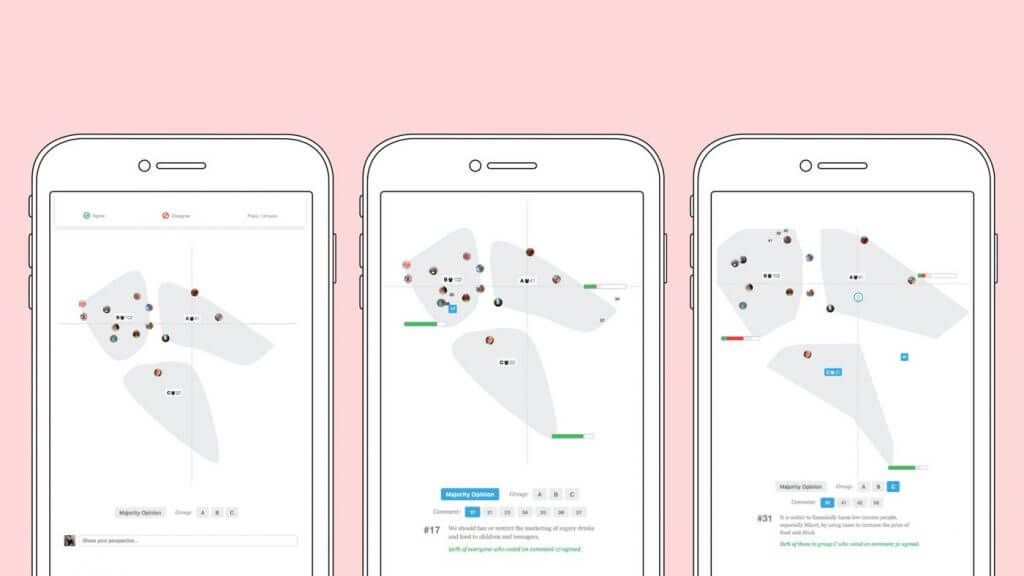On Thursday, November 29 we have joined the Innovating Democracy 2018 event organized by the Netherlands Institute for Multiparty Democracy (NIMD) and the Enabl.ist, a do & think tank for innovation and participation. The event featured Colin Megill of pol.is as a keynote speaker. In his presentation, Colin touched upon the importance of transparent and open use of software in order for democracy to be strong and evolving. Pol.is, an open source software program created by Colin and his team, does exactly that through its use of citizens data science as a means of informing political decision-making. NetDem was lucky enough to interview Colin to get insights into the history of the creation of pol.is and his opinion on why it is important for everyone to start programming to not fall behind on social development.
Colin Megill is a chief executive officer of pol.is, a Seattle-based open source tech startup which leverages the real-time Web, machine learning, and interactive data visualization in order to gather sentiment in an organic, and scalable way. Primarily focusing on front-end development, product, and information design, as well as, interactive data visualization, Colin also designed and built client-side applications and trained teams for some of the largest brands in the world across multiple industries. From such an introduction one could assume that Colin is a classical representative of the information technology industry, which has become the fastest growing industry in the world. However, even though as of now Colin works in the Artificial Intelligence and “builds interactive data exploration interfaces for the web”, he has his academic roots in the international relations discipline. In their work Colin and the two other founders of pol.is bridge the gap between machine learning and social science in order to help politicians understand what the electorate is feeling.

How & Why Was Pol.is Made
Pol.is was created as a way to try to ‘platformitize’ [to make into a platform] a tool which would feature machine learning and some type of a representative review of a mass qualitative data to try to inform the decision-makers on what’s going on all around. – Colin Megill
Towards junior and senior years of his studies at the University of Connecticut, Colin became increasingly interested in the idea of collective decision-making. This interest originated from his frustration with the major frameworks of thinking about various political decision-making models. According to the developer, the existing models alienated him and made him reflect on the possible alternatives. After the Arab Spring has shown the world the power of the Internet in mobilizing people, Colin started to think about what needs to happen next, since “you can’t write a constitution on Twitter”. This was the problem space of the creation of pol.is. After moving to Seattle and working together with his co-founders, Colin became increasingly more interested in machine learning. After the first year or two of working in the sphere of software engineering, Colin put out a form on POPLUS asking whether there was anyone who wanted to work with pol.is. Even though the request was “just shooting in the dark”, Chia-Liang Kao, Taiwanese open source developer and founder of g0v, was on that platform and connected pol.is with Audrey Tang, Digital Minister of Taiwan. This is how pol.is was integrated into vTaiwan, a crowdsourcing tool that put Taiwan onto the forefront of democratic innovation.
Objectives of Pol.is
If we are going to do participatory democracy, we need to scale things up, something more than just getting people in the room.
During his presentation of pol.is Colin criticized the way in which political decision-making works in the United States. According to him, the decision-making process works inversely from how it is supposed to work, in this process decision-making on the part of the representatives defines the political conversation whereas, he believes, it should be vice versa. However, what has always been a problem in the domain of public political conversation is the largeness of its scale, which makes it really difficult for people to communicate rationally and effectively. In order to fix this, Colin and his co-founders had a big job in front of them. This is the problem space from which pol.is was born. By combining machine learning and interactive data visualization, pol.is allows the governments to collect and synthesize large amounts of qualitative data, creating visual nuanced maps of public opinion. This is done in order to create a more holistic understanding of the political and social ecosystem for those who make the decisions. The analysis that pol.is does is based upon the voice of people, setting the stage for more understanding, empathy, and, possibly, generating consensus.
How does Pol.is Work?
Whenever someone tries to portray the roiling social reality with only quantitative data, the larger population gets upset because it is not representative of humans. Therefore, pol.is works with both qualitative and quantitative data. Once the government creates an issue on pol.is, citizens have a capacity to add their short (up to 140 characters) statements and vote on those of others. This allows for intake of qualitative data from the crowd in a way that is authentic to them. By allowing citizens to submit statements, what pol.is essentially doing is allowing the population to create the dimensions that stir and deepen the political discussion while including many directions. More technically, such large-scale statement input creates a high-dimensional space that is then crunched and made comprehensible through the use of a statistical procedure called principle component. Finally, another statistical algorithm (k-means) takes the statement matrices and clusters them into groups, which allows seeing which statements generated relative consensus and which ones won everyone.
One example of an issue that was resolved through the use of pol.is in Taiwan, was the six-year gridlock on the regulation of online alcohol sales. According to Audrey Tang pol.is “allowed different sides to gradually see that they share the same underlying concern despite superficial disagreements”. Pol.is allowed the population of Taiwan to discuss, evolve, and store their ideas all in the same space. All the dimensions of the issue put forth by the citizens were taken into consideration and clustered in real-time. In case of the alcohol sales in Taiwan, when pol.is analysis was carried out it was interesting to find that the public mostly agreed with each other.
One might ask the question of how the general public could get effective governance from non-specialists – Colin argues that we undervalue how people come across politics in their work on day to day basis, and this is why pol.is acknowledges that people are very deeply invested. Through the use of pol.is people are given a “single and direct touchpoint with power”, which tells them that they are not ignorant and that their opinions are seriously taken into account. Colin states that constructive participation needs to be seen as comprehensible and meaningful. By showcasing this about participation we can create new pools of legitimacy that begin to question the idea of representation.
On Open Source
Myself and my co-founders, we just built it and we sacrificed a lot of income that we could have earned for ourselves and we did not earn it. So, it takes that, open-source takes the time that you could be spending doing something else.
As mentioned earlier, pol.is is an open source tool, meaning that all of its source code is freely available. This allows for the code to be collaboratively perfected and modified, and, thus, the community can benefit from collective innovation. Since the software is freely available, it is also transparent, which allows anyone to assess whether it is fair. This characteristic of open source makes it highly practical to use in democratic processes. People have an expectation that open source developers have to maintain the software they have created. However, making open source software such as pol.is comes at a high financial cost to the developers, which is oftentimes overlooked. If the governments want open source tools such as pol.is to be maintained and further developed, it has to be invested in.
Keep an Eye on Artificial Intelligence
“AI and machine learning work, these are very effective and powerful technologies that have an effect and everything that has an effect can have a positive or negative one based on the people who use it. You can build the hammer and you can hit something with it.”
Our current social, economic, and political realities, are increasingly more driven by technology. During our interview we asked Colin what technological innovations are important to keep an eye on. In his opinion machine learning, oftentimes referred to as AI, is under-hyped and the global population “hasn’t actually grasped to what degree machine learning has actually transformed into almost every realm”. Colin further argues that it is machine learning that is helping us make a transition as a species from being overwhelmed by the turbulent sea of information to be able to comprehend it. He also points out that while many are still not aware of the power that AI plays, the technology has been taken up and further developed by totalitarian regimes. For instance, Colin expressed extreme concern with the way AI is used in facial recognition behind the Chinese social credit system. He condemns it as “objectively totalitarian, immoral, and dehumanizing” further arguing that anyone who lives in a free society should object to such technological practices. Another development in the use of AI that Colin points out as important to keep an eye on, is Putin’s recognition of the role of AI in the future of warfare, adding that countries that are not developing expertise in this technology will soon fall back in terms of defense.
What Can and Should Citizens Do?
If we have provided any example of that, we would be happy. We were a team of three people, we built pol.is and we’ve had an impact on the governments around the world in their application of AI FOR democracy.
Answering the question posed above, Colin urged that it is never too late for anyone to learn how to program and become a software developer. According to him, one of the most empowering parts about this domain is that it is possible to create incredible applications within small teams of just one front-end and one back-end developers because of access to the API. He urges that it is important that the public in any free society needs to recognize the need for using AI for the development and advancement of democracy since totalitarian regimes have already entered the game. Indeed, we can see from Colin’s example that even those of us without the background in software developing can enter the market, teach themselves how to program and if they are persistent enough become fully-employable software developers. He added that the fight for democracy and democratic values has to come from the bottom up and it is our responsibility to keep pushing our governments to employ innovative technology.



